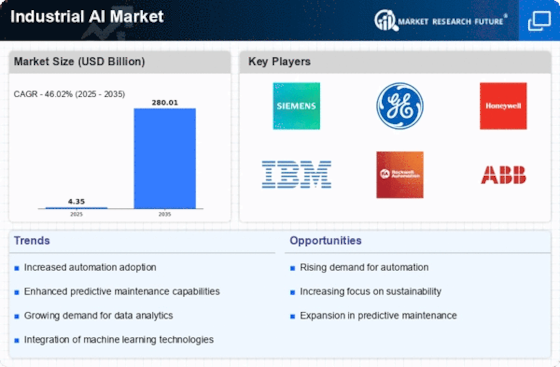Market Analysis
In-depth Analysis of Industrial AI Market Industry Landscape
The Industrial AI Market is shaped by a multitude of factors that collectively contribute to its growth and transformation of industrial processes. One of the primary drivers propelling this market is the increasing need for operational efficiency and productivity in industries. Industrial AI solutions, powered by machine learning algorithms and data analytics, enable organizations to optimize production processes, predict equipment failures, and enhance overall efficiency. The ability of AI to analyze vast amounts of data in real-time and provide actionable insights plays a pivotal role in modernizing industrial operations.
The Industry 4.0 revolution, marked by the integration of smart technologies and automation, significantly influences the Industrial AI Market. As industries embrace the concept of interconnected and intelligent manufacturing systems, AI becomes a key enabler in creating smart factories. Industrial AI applications, such as predictive maintenance, process optimization, and quality control, contribute to the realization of Industry 4.0 principles, driving the market forward.
Technological advancements, particularly in AI algorithms, edge computing, and Internet of Things (IoT) integration, contribute to the evolution of the Industrial AI Market. AI solutions are becoming more sophisticated, capable of handling complex tasks, and offering real-time insights. Edge computing allows AI algorithms to be deployed directly on industrial devices, reducing latency and enabling faster decision-making, while IoT integration facilitates the seamless connectivity of devices for data exchange and collaborative analysis.
The ongoing global emphasis on sustainability and environmental responsibility is another crucial factor influencing the Industrial AI Market. AI applications help industries optimize energy consumption, reduce waste, and minimize environmental impact. Predictive maintenance powered by AI contributes to the efficient use of resources, prolonging the lifespan of equipment and reducing the need for frequent replacements.
The COVID-19 pandemic has accelerated the adoption of Industrial AI as industries strive to build resilient and agile operations. The need for remote monitoring, predictive analytics, and automated processes became more apparent during the pandemic, prompting industries to invest in AI solutions that enhance their ability to adapt to unforeseen challenges. The pandemic underscored the importance of AI-driven technologies in maintaining business continuity and ensuring operational stability.
Security considerations are paramount in the adoption of Industrial AI, especially in critical industrial environments. Industrial systems often handle sensitive data, and ensuring the security of AI applications is crucial to protect against cyber threats and unauthorized access. The integration of robust cybersecurity measures and adherence to industry standards contribute to the safe deployment of AI in industrial settings.
The competitive landscape and collaborations within the industrial sector significantly influence the Industrial AI Market. Collaboration among technology providers, industrial equipment manufacturers, and AI developers fosters innovation and the development of tailored AI solutions for specific industrial use cases. Partnerships between technology companies and industrial firms contribute to the seamless integration of AI technologies into existing industrial infrastructure.
Government initiatives and regulatory frameworks play a pivotal role in shaping the Industrial AI Market. Governments around the world are recognizing the transformative potential of AI in industrial processes and are investing in initiatives that promote AI adoption. Regulatory guidelines that ensure the responsible and ethical use of AI contribute to creating a conducive environment for industrial AI deployments.
Economic factors, including cost-effectiveness and return on investment, influence the adoption of Industrial AI solutions. Industries often assess the economic viability of AI implementations by evaluating the potential cost savings, increased efficiency, and improved overall productivity. Demonstrating the tangible benefits of Industrial AI becomes essential for widespread adoption across diverse industrial sectors.


















Leave a Comment